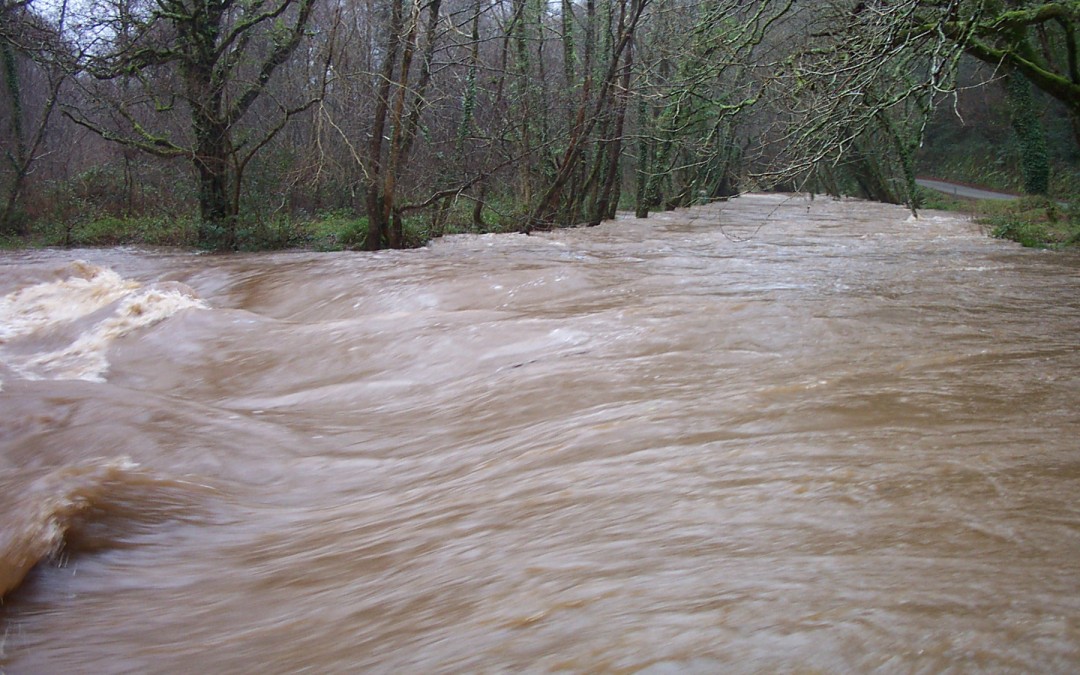As the South West battles through a relentless period of extreme weather, Dr Laurence Couldrick of the Westcountry Rivers Trust argues that we all need to face up to our responsibility to reduce the impact of flooding through better land management.
In the small hours of Sunday 7th February I lay awake as Storm Imogen beat its heart against our 200-year old house. The previous morning, I had left for work to find the lane from our house had turned into a river. Tucked up in bed next to a once scared, now snoring, 4 year old my thoughts move from ‘will the roof rip off?’ to those living closer to our rivers and coast who are currently fighting a losing battle against nature. We have had over 100 days of storms and seem to be working our way quickly through the alphabet from Desmond to Imogen with the UK being ravaged by wave after wave of weather front. Some houses have been flooded half a dozen times already since November. But who is to blame for the onslaught of flooding we have faced over the winter?
The short answer – all of us. Since the Second World War we have demanded more: more space to build and more food from our land. We have built our homes in floodplains and asked farmers to increase production. This has meant ploughing up wetlands and woodlands, removing hedges and installing land drains to make fields larger and free draining, increasing stocking densities and crop rotations, straightening and deepening ditches and rivers and using nitrogenous fertilisers and other agrochemicals. This has had the desired impact – yields went through the roof to the point where in the 1980’s we had too much and paid farmers to set land aside to stop ‘food mountains’ – but the bi-product is that fields are now more likely to be compacted, and water is channeled from the land in minutes not hours, taking everything with it: soil, nutrients, pesticides and seeds – basically soil fertility.
Alongside this, our weather patterns are changing. Irrespective of whether you chose to believe the overwhelming evidence regarding man-made climate change you can’t help but accept that our weather has become more variable.
Increasingly, we hear the media using phrases like “this is the fourth ‘one in a hundred’ year storm this year!“, but the figures used to predict these return rates are historic and wrong and do nothing to help communities in flood risk areas. Our rainfall is more intense and more frequent and as a society we have spent the last 70 years trying to move water from where it falls to the sea as quickly as possible. We need to move to a new mindset where we talk about how much rain we can cope with before the towns and cities are overwhelmed and if we can then increase our ability across the landscape to deal with more intense rainfall. All the while understanding that there will always be a bigger storm that goes beyond this.
So what’s the solution? There are 60 million people on this island and we need food as well as flood risk protection, not to mention adequate drinking water, clean bathing waters and sustainable river fisheries. The answer has to be getting better at understanding, communicating and paying farmers for what we need as a society. It won’t happen overnight, but if we are clear about what we want farmers can slowly accommodate this within their business models. This is not helped by the complex farm grants programme we currently have and is certainly not as sexy as introducing beavers to improve our streams and rivers, but one-to-one advice and grants can slowly but surely remove the drivers for compaction and install natural features that slow and purify water.
I have worked at the Westcountry Rivers Trust for 14 years and despite changing subsidies, the increasing costs of raw materials and a dramatically altering political landscape, we have constantly provided this service with considerable effect. Over 85% of farmers engage with our officers and most take up advice as it is aimed at improving their business not just the environment. This has led to less soils, nutrients and pesticides leaving their land which is great for the river and the species that live in them but it is also great news for the farmers as it saves them money. This approach is enshrined in the newest of our Upstream Thinking programmes funded by South West Water above their drinking water abstraction points but we are also working up projects to help slow water down upstream of areas that flood. This doesn’t mean that we should abandon all past practices. There are plenty of places where we can intensify production as the soil is stable and less likely to erode or lose nutrients and there are rivers where we need to dredge them to speed water through important towns and cities.
So as Storm Imogen starts to loosen its grip, I am left even more resolved that the answer is proper integrated river catchment management where we can understand and articulate where across our landscape we need to balance food, drinking water, flood risk protection, habitats and recreational areas. From this we can then help landowners and farmers adapt their business models in a slow and steady shift towards a more balanced landscape. Only then will we be able to get the resilient landscape we need to cope with society’s complex demands.

